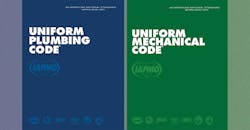IAPMO Publishes 2024 Editions of Uniform Plumbing Code, Uniform Mechanical Code
ONTARIO, CA — The International Association of Plumbing and Mechanical Officials (IAPMO®) has published the 2024 editions of the Uniform Plumbing Code® (UPC) and Uniform Mechanical Code® (UMC) in both hardcopy and electronic versions, completing a three‐year consensus development cycle accredited by the American National Standards Institute (ANSI).
Significant changes to the UPC include:
- New provisions for tileable shower receptors and kits
- Provision for temperature-actuated, flow reduction devices for individual fittings
- New provisions for all-gender facilities, including fixture count, privacy compartments, and partitions
- New requirements for water supply and distribution manifolds
- Updated provisions for hot-water recirculating systems
- New provisions for private well water tanks
- Updated provisions for appliance condensate drains when serving more than one appliance and connecting to a common indirect waste pipe
- Updated minimum water quality provisions for onsite treated nonpotable water systems, nonpotable water devices and systems, for harvested rainwater systems
- Update water supply fixture unit (WSFU) and drainage fixture unit (DFU) values for bathroom groups in Appendix C;
- New Appendix O providing minimum non-sewered sanitation systems
- New Appendix P providing minimum qualifications for inspectors, examiners, service technicians, installers, and administrators relating to systems addressed in the UPC
- New Appendix Q addressing plumbing requirements for indoor horticultural facilities
- New Appendix R providing minimum plumbing system requirements for tiny houses
- New Appendix S with provisions pertaining to onsite stormwater treatment systems
Significant changes to the UMC include:
- New minimum air filtration requirements for occupied spaces of mechanically ventilated buildings
- Revised outdoor air intake requirements for transient occupancies
- New air balancing requirements for ventilation systems
- New exceptions for materials exposed with ducts or plenums
- New provisions for high-probability systems using Group A2L refrigerants for human comfort applications
- New refrigerant safety group classifications based on flammability and toxicity
- New requirements for refrigeration machinery rooms where A2L and B2L refrigerants are used
- New materials standards for refrigerant piping, tubing, and fittings
- New design requirements for geothermal district ambient temperature loop (ATL) systems
- New Appendix H providing minimum qualifications for installers, inspectors, or employers for systems covered by the UMC
- New Appendix I addressing mechanical system requirements for indoor horticultural facilities
- New Appendix J addressing CO2monitoring and clean air delivery for adequate ventilation in occupied spaces
The 2024 Uniform Codes will once againbe available electronically, meaning that if someone is working from home or in thefield and left the code book at the office,it is accessible from a computer or mobile device.
Development Process
The Uniform Codes are developed using IAPMO’s ANSI-accredited consensus development procedures. This process brings together volunteers representing a variety of viewpoints and interests to achieve consensus on plumbing and mechanical practices. The 2024 editions of the UPC and UMC mark the eighth time these codes have been developed in this manner.
IAPMO urges its members and other interested parties to get involved in the process to ensure effectiveness in preserving the public’s health, safety, and welfare through fair and balanced development of its codes and standards. Installers, plumbing and mechanical officials, the construction industry, engineers, and manufacturers all benefit from a cooperative effort in developing codes.
Public Safety and Welfare
Introduced in Los Angeles in 1928 and formally published as the Uniform Plumbing Code in 1945, the UPC is developed to govern the installation and inspection of plumbing systems as a means of promoting the public’s health, safety and welfare. Later published by IAPMO in 1967, the UMC provides the same governance for mechanical (HVAC, combustion, exhaust, refrigeration) systems. Developed and subsequently republished at the conclusion of each three-year code cycle, the UPC and UMC are designed to provide consumers with plumbing, heating, and mechanical systems that meet all applicable standards while, at the same time, allowing latitude for innovation and new technologies.
The public at large is encouraged and invited to participate in IAPMO’s openconsensus code development process. A code development timeline and other relevant information are available at IAPMO’s website:
https://www.iapmo.org/code-development/
The 2024 UPC and 2024 UMC may be purchased through the IAPMO bookstore at: https://iapmomembership.org/store/
Should you have any questions regarding the UPC, please contact Enrique Gonzalez at 909/230-5535 or email at [email protected]. For the UMC, contact Taylor Duran at 909/218-8126 or email at [email protected].
